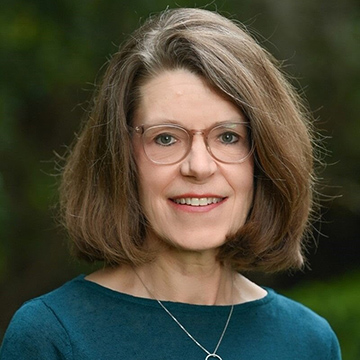UNF professor empowers future STEM educators through innovation and computational thinking
 From graduating at the top of her class at the U.S. Air Force Academy to becoming a faculty leader at the University of North Florida, Dr. Terrie Galanti brings a rare blend of discipline, vision and service to the field of mathematics education. Her story is one of bold pivots, purposeful pauses and an unwavering commitment to expanding access and opportunity in STEM for future generations.
From graduating at the top of her class at the U.S. Air Force Academy to becoming a faculty leader at the University of North Florida, Dr. Terrie Galanti brings a rare blend of discipline, vision and service to the field of mathematics education. Her story is one of bold pivots, purposeful pauses and an unwavering commitment to expanding access and opportunity in STEM for future generations.
"My high school counselor told me I could be 'so much more' than a math teacher," Dr. Galanti recalls. "But I've always believed that there's no higher calling than shaping the minds of students and expanding who sees themselves as capable in STEM."
After graduating first in her class, the first woman in history to do so, from the U.S. Air Force Academy in 1986, Dr. Galanti pursued a master's in computer engineering at Stanford University as a National Science Foundation Graduate Fellow. She later served as a project officer on satellite and intelligence systems before stepping away from the workforce in 1992 to focus on parenting. She says that time only deepened her understanding of how children learn and grow.
Her return to education came through the K-12 classroom: first as a substitute, then as a certified high school mathematics teacher. With nearly two decades of experience, she transitioned to higher education after earning her Ph.D. in Mathematics Education Leadership from George Mason University. She joined the UNF faculty in 2020.
Recently, Dr. Galanti's research has explored how to better prepare teachers to lead rigorous, integrated STEM instruction. Her work focuses on:
- Project InTERSECT, a U.S. Department of Education-funded initiative with Duval County Public Schools, where she previously led research on how elementary teachers develop STEM identities and instructional confidence.
- Algebra acceleration and persistence in STEM, building on her dissertation to explore how cultural ideas about who is "good at math" influence student trajectories.
- Physics teacher development through NEFSTEM and the PhysTEC coalition, with a focus on digital badging and computational thinking.
- AI in K-12 math classrooms, where she is currently piloting ways to use artificial intelligence as a collaborative tool that fosters productive struggle and deeper conceptual understanding.
At the heart of all her work is a simple but powerful goal: to ensure that more students, across all backgrounds, have the opportunity and encouragement to pursue STEM education with confidence.
"I look forward to a future when more students see themselves in STEM," Dr. Galanti says. "Until then, I'll keep working to increase opportunities for students to thrive in these fields."
